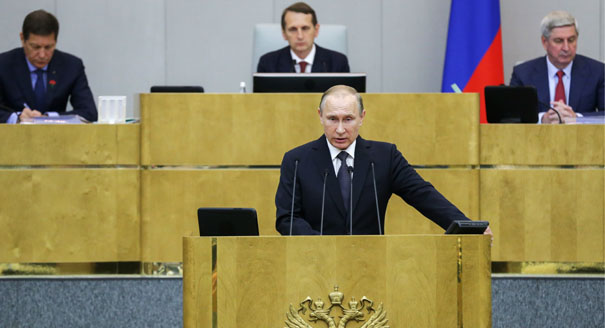Russian President Vladimir Putin made a rare appearance in the State Duma, the lower chamber of the Russian parliament, during the final plenary meeting of its spring session on June 22. The visit is interesting not because of his fairly routine—though artfully tongue-in-cheek—speech, but because he went at all, in a bid to lend legitimacy to the Duma ahead of its upcoming elections.
This is the first time Putin has addressed outgoing Duma deputies, besides his appearance in 2011 when he was the prime minister. His aversion to the parliament is understandable: the Russian population has very little trust in government institutions, the State Duma, and political parties in particular.
In September, the country will elect a new Duma for the first time since the 2011 parliamentary elections that were marred by electoral fraud and prompted months of massive street protests across Russia.
Putin’s deputy chief of staff Vyacheslav Volodin is painstakingly attempting to paint the upcoming elections as competitive, open, and legitimate, and a presidential visit nicely reinforces this rhetoric.
Volodin has already instituted a revolutionary new head of the Central Election Committee, canceled elections in the Moscow suburb of Barvikha amid complaints of violations, and fired the head of the Moscow region’s election commission. The recent primaries of the United Russia party, the strengthening of the All Russia People’s Front (ARPF), and the friction between the ruling party and regional governors also add to the image of transparent elections.
Ever the diligent student, Putin came to the Duma to bless Volodin’s road map for the upcoming elections. That plan consists of the regime preparing itself for a period of turbulence, hoping that sufficient shock absorbers will help them weather any potential political bumps. Whether they will be needed is a separate question, but Putin learned his lesson in 2011.
The president’s appearance is also an attempt to brighten the faded Duma seats with his political legitimacy. The Duma deputies have been the butt of endless jokes in recent years for their eagerness to approve everything the authorities suggest. What do the deputies actually determine? They have to comply with their own faction’s ideology, and their faction operates within the narrow world of what is permissible, so narrow that the difference between the ruling party and the opposition is almost imperceptible. The political value of a parliamentary mandate—material value or status aside—is rapidly approaching zero.
The absence of political agency on the part of the deputies allows the Kremlin to create the semblance of a diverse political discourse. Even if something goes awry and the new Duma gets populated by the wrong people, it will always be possible to tame them. The authorities have a vast array of methods to influence the deputies, and there’s a well-honed system for expelling dissenters from the lower chamber of parliament.
But all this creates a paradox. As the struggle for a mandate grows, the Duma’s lack of power becomes obvious. This calls for a presidential visit, to signify the attention of a higher political class to a lower one.
Until now, Putin had preferred to confer his political legitimacy primarily on the ruling party. He only met with the Communist Party, the Just Russia party, and the Liberal Democratic Party as opposition forces. This is why the president hadn’t spoken at the Duma before: he would not just be speaking in front of his own party but also in front of his “constructive opponents,” as Putin likes to refer to them.
The annexation of Crimea in 2014, which was voted against by just one deputy, washed away this convention. The whole of the Duma now belongs to Putin, and the future Duma will belong to him too, regardless of how the seats are allocated. Given the current political climate, the Kremlin can afford to play at competition: whoever the winner is, they’ll cooperate.
Putin also came to the Duma to raise the stakes, and incorporate the upcoming elections into the geopolitical standoff between Russia and the West. The president drew an extensive parallel in his speech with 1939, when, he said, the West was unwilling to see the real threat (today, the role of fascism is played by terrorism) and ignored Soviet proposals to rein in the Nazis.
In this fantasy, the Duma is the sturdy pillar of government in a time of unrest, and in his speech Putin thanked it for its resolute, consolidated, and significant support. The geopolitics of the day leave practically no choice for the parliament: in the face of imminent war, checks and balances must be put into long-term storage.
Continuity, consolidation, and cohesion were the key terms of Putin’s address, the goal of which was to ensure that the post-election Duma looks like the current one, even if it has new faces. Putin gave a political command in his speech: the new Duma must be no worse than the old one; in his words, authoritative, independent, and high-quality.
Putin’s address was deeply conservative in content and artfully liberal in rhetoric. He frames being elected to the Duma as being elevated to the ranks of the chosen few. The right to be a Putinist is celebrated, and it’s out of the question that the institution might let in “irresponsible forces”: a favorite term of the Russian ruling class that allows them to draw a line between the political forces they allow and the real threats to their power.
Putin’s ideal Duma, one which he practically talks about openly, is one where all factions and parties are united in agreement. In this dream lies the main paradox of the current political moment: liveliness of form but a complete absence of content. And the paradox cannot continue to exist for much longer.
In the end, either the form will determine the content, slowly liberalizing the system, or the content will shut down the liberal rhetoric. The upcoming elections may determine which of these two modes of government wins out, and the authorities are well aware of that.



